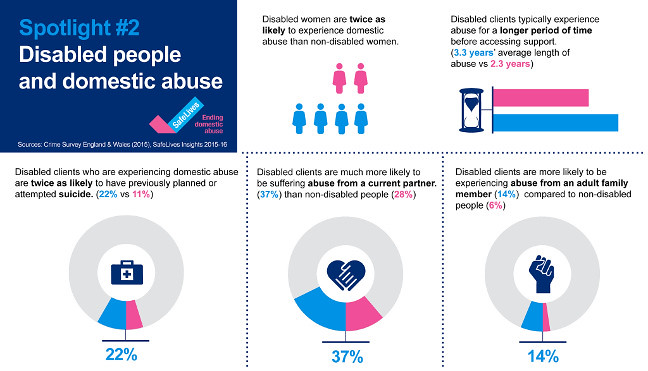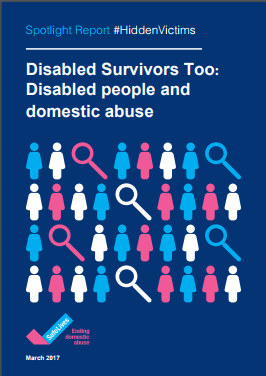Spotlight #2: Disabled people and domestic abuse

Studies have shown that disabled women are twice as likely to experience domestic abuse and are also twice as likely to suffer assault and rape. Yet our Marac data shows that nationally only 3.9% of referrals were for disabled victims, significantly lower than the SafeLives recommendation of 16% or higher. Our research also shows low referral rates for disabled people into domestic abuse services.
In the second of our Spotlights series, which runs through October and November, we’ll focus on the challenges facing professionals working with disabled people experiencing abuse. What can we do to enable disabled people’s access to domestic abuse support and to Marac? How can we make sure they become – and stay – safe?
We'll post the latest research and practical resources for professionals working with this client group. This is also your chance to hear from experts around the UK via webinars, blogs and podcasts, and share your thoughts in our live Twitter Q&A which takes place on Friday 2 December between 1pm and 2pm – use the hashtag #DisabledSurvivorsToo.
You'll find new content every week – so bookmark this page for the latest updates, subscribe to our practice and policy blogs, or follow us on Twitter and Facebook to stay in the loop.
Read the report
Our policy report, Disabled Survivors Too, brings together our own research along with the expertise of our partners and the voices of survivors, to help inform practice and policy. Download the report.
If you would like to reference this report, please use the following: SafeLives (2017) Disabled survivors too: Disabled people and domestic abuse.
Survivor stories
We were delighted to work with SignHealth, the UK's only sign-language based domestic abuse service. We spoke to some of the brave women they have supported, about their experiences of domestic abuse and disability. You can watch their interviews via the links below – names have been changed.
Guidance and more
Making the Marac Process work for Disabled People
What does Marac data tell us about disabled people accessing support services? [audio version]
A week in the life of the UK's only specialist Deaf Idva Service
In this blog post, the SignHealth team share with us the complex work that their highly experienced team carry out weekly.
Helping Women with Learning Disabilities Express Their Views
Lois Cameron, a director at Talking Mats®, writes about a communication tool that can help identify women with learning disabilities who are also expereincing domestic abuse.
10 Key Practice Points for Supporting Clients with Learning Disabilities
Collette Eaton-Harris shares practical tips for including people with learning disabilities in domestic abuse services.
Disability and domestic violence
Dr Justin Varney, National Lead for Adult Health and Wellbeing at Public Health England, talks about the different ways domestic abuse affects people with impairments, and the barriers they face in getting help.
Recognising and supporting disabled victims
Ruth Bashall, director of Stay Safe East, discusses the unique risks faced by disabled victims of domestic abuse, and how to support disabled victims referred to Marac.
Understanding disabled women's experiences of domestic abuse
Dr Ravi K. Thiara, principal research fellow at the University of Warwick, explains how the concept of intersectionality can deepen our understanding of the ways in which disabled women experience domestic abuse.
Guidance for multi-agency forums: Supporting disabled people
Listen to our podcast
Read the transcript of this episode in a text file
Read the transcript of this episode in a pdf file
Read the transcript of this episode in a text file
Read the transcript of this episode in a pdf file
